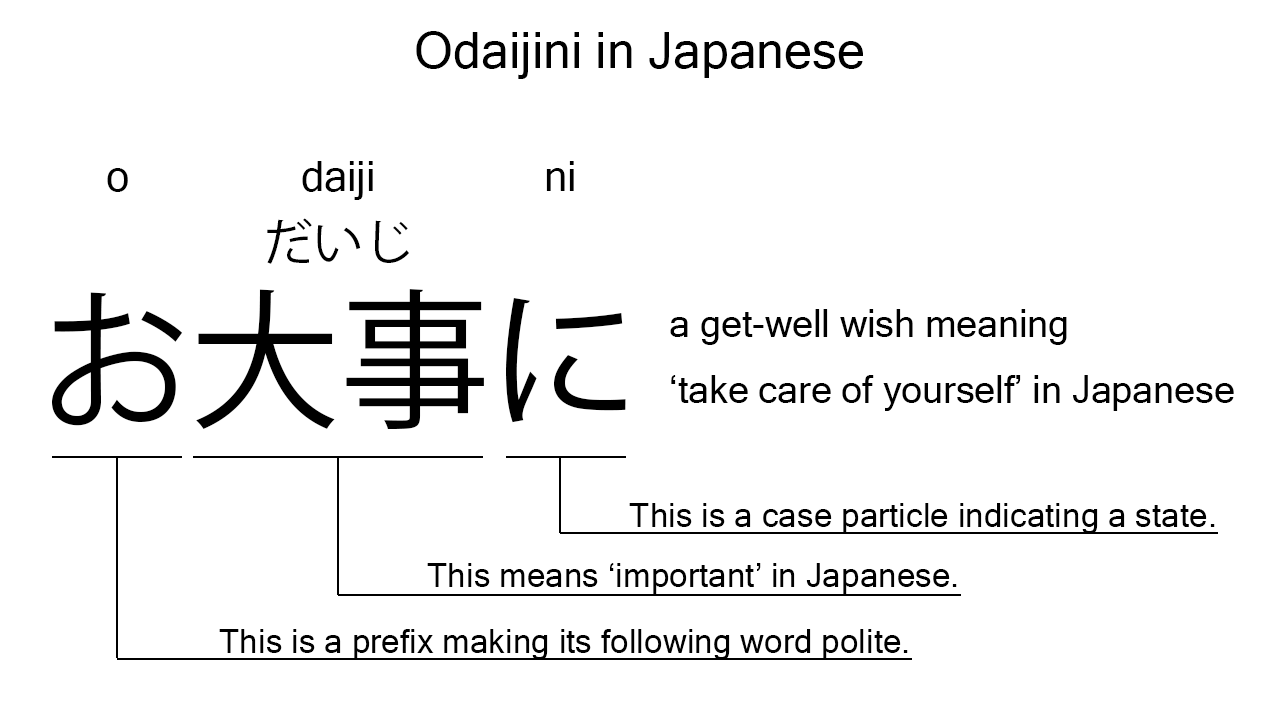What does “odaijini” mean in Japanese?
Native speakers say “odaijini” to mean ‘take care of yourself’ or ‘get well soon’ in Japanese. Perhaps, some Japanese learners know this phrase as it is sometimes used in Japanese conversations. In this blog post, however, I will explain it in detail based on its grammatical components. And also, I will explain how to use it through an example sentence. My explanations would help Japanese learners understand “odaijini” more clearly. Then, let’s get started!
Contents
Definition and meanings of “odaijini”
Let me start with the definition and meanings of “odaijini”.
- odaijini – お大事に (おだいじに) : a phrase meaning ‘take care of yourself’, ‘get well soon’, or such in Japanese.
Native speakers use this phrase as a get-well wish to mean ‘take care of yourself’, ‘get well soon’, or such in Japanese.
The definition and meaning are not that difficult, I think. To understand this phrase more clearly, however, let me explain its grammatical components in detail, one by one.
What does “odaijini” literally mean?
“Odaijini” consists of the following three components:
- o – お : a prefix making its following word polite.
- daiji – 大事 (だいじ) : the stem part of the na-adjective, “daijina”, which means ‘important’ in Japanese. This can also work as a noun to mean an ‘important thing’ in Japanese. These two kanji characters literally mean ‘big’ and ‘thing’ respectively.
- ni – に : a case particle used to say what state someone or something is in after a change or action. In the phrase, this is used after “odaiji” to indicate the particular state which something is in.
These three components tell us that “odaijini” is literally a polite expression asking someone to consider something as important. In general, Japanese native speakers love indirect phrases. So, “something” is not clearly mentioned here. In most cases, however, it can be considered as the listener’s health condition. “Odaijini” is, therefore, a get-well wish asking the listener to consider their health condition as important.

When we meet new Japanese phrases, we should check their components in detail to understand their meanings clearly and deeply. In many cases, grammatical components tell us a lot about the meanings of the phrases they form. Actually, here, we could get the better understanding of “odaijini” through the detailed check above.
So far, I’ve explained the definition and meanings of “odaijini” together with its grammatical components. Then, let me explain how to use it through the example sentence below.
Example : how to say “take care of yourself” in Japanese
「odaijini」 to kanojo ga watashi ni it ta – 「お大事に」と彼女が私に言った (「おだいじに」とかのじょがわたしにいった)
“Take care of yourself,” she said to me.
Below are the new words used in the example sentence.
- to – と : a case particle working as a quote marker. In the example, this works after the clause to indicate what she said.
- kanojo – 彼女 (かのじょ) : a pronoun meaning ‘she’ in Japanese.
- ga – が : a case particle used to make the subject word or the object word in a sentence. In the example, this is used after “kanojo” to make the subject in the sentence.
- watashi – 私 (わたし) : a pronoun meaning ‘I’ in Japanese.
- ni – に : a case particle used to say in which direction an action goes. In the example, this is used after “watashi” to say to whom she said.
- it – 言っ (いっ) : one conjugation of the verb, “iu“, which means ‘to say’ in Japanese. In the example, it has been conjugated for the better connection with its following word.
- ta – た : an auxiliary verb used after a verb, adjective, or auxiliary verb to make its past tense form. In the example, this is used after “it” to make its past tense form, “it ta”.
This is a typical usage of “odaijini”. When we want to say “take care of yourself”, “get well soon”, or such in Japanese, this is always a very good option.
Summary
In this blog post, I’ve explained the definition and meanings of “odaijini” in detail based on its grammatical components. And also, I’ve explained how to use it through the example sentence. Let me summarize them as follows.
- odaijini – お大事に (おだいじに) : a phrase meaning ‘take care of yourself’, ‘get well soon’, or such in Japanese. This is literally a polite expression asking someone to consider something as important. In general, Japanese native speakers love indirect phrases. So, “something” is not clearly mentioned here. In most cases, however, it can be considered as the listener’s health condition. “Odaijini” is, therefore, a get-well wish asking the listener to consider their health condition as important.
Hope my explanations are understandable and helpful for Japanese learners.